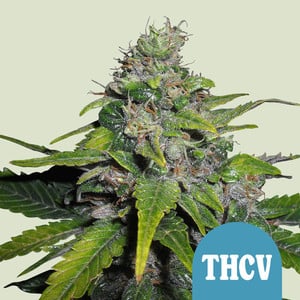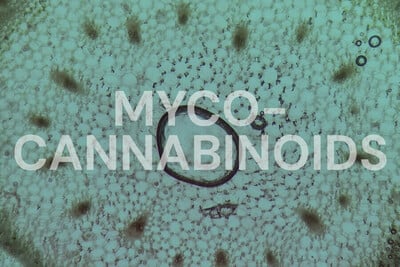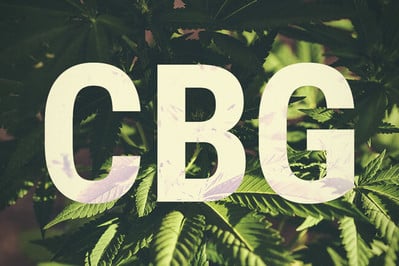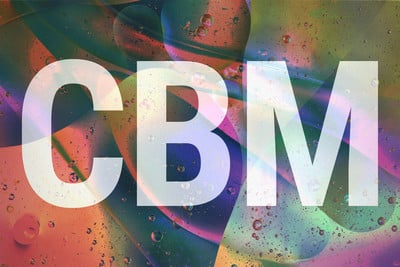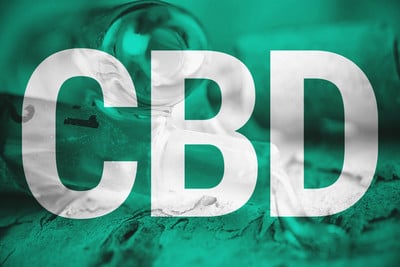.

What Is THCV & How Does It Compare to THC?
THCV is a cannabinoid that is starting to get a lot of attention from researchers and cannabis users alike. It’s a rare compound only present in very small amounts within some cannabis strains plants, yet its properties are very interesting from a medical point of view. Will THCV become as popular as CBD and THC?
Contents:
Key Points
- THCV is a novel cannabinoid that produces unique effects.
- At high doses, it offers an energetic, clear-headed high with a short duration.
- Researchers continue to test THCV in models of weight management and diabetes.
- Discover the strains containing the highest THCV levels and try them for yourself.
Although a close cousin of THC, tetrahydrocannabivarin (THCV) offers a distinct experience, exerting a notable psychoactive effect only at higher doses. In small quantities, the cannabinoid produces a clear-headed sensation, and may curb appetite.
Until recently, only certain landrace and wild-type plants served as a viable source of THCV. Now, modern hybrids are being released that offer increased concentrations of this desirable cannabinoid.
THC and CBD still dominate the limelight when it comes to cannabinoids, but THCV is certainly a rising star. Past its recreational uses, researchers are continuing to assess the molecule for its therapeutic potential, especially in the context of weight loss, energy, and mental clarity.
Below, you'll find out everything you need to know about this up-and-coming cannabinoid and the go-to strains to experience it.
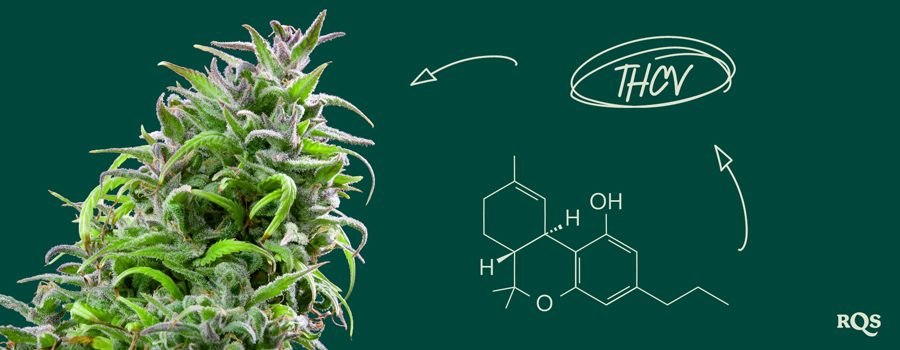
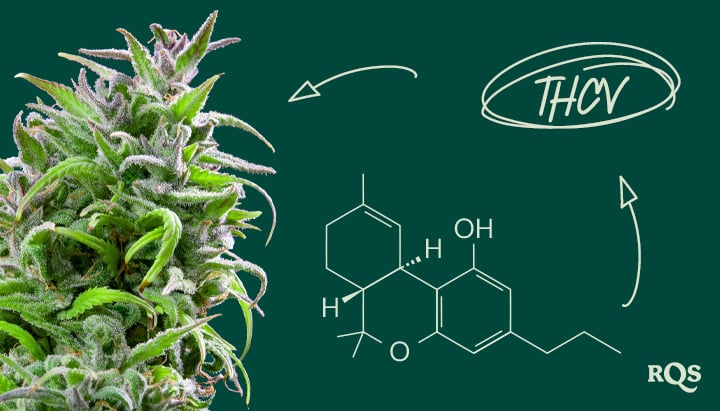
What Is THCV?
So, what exactly is THCV in weed? This molecule belongs to a chemical family found in cannabis (and some other plants) known as cannabinoids. It exists alongside the likes of THC, CBD, and over 100 other similar compounds.
Plants create these chemicals to defend themselves against various external threats, including heat, light, and pests. However, many of them also happen to interact with the human endocannabinoid system (ECS)—a large signalling network found all throughout the body. Much like THC, THCV engages with the CB1 receptors of the ECS.
As their names suggest, THCV and THC have similar molecular structures and, to an extent, effects. However, THCV possesses unique properties that result in different interactions in humans.
These interactions, as it turns out, may have clinical implications. While it’s too early to make any solid conclusions, researchers are currently testing THCV in a range of disease models.
Where Does THCV Come From?
The biosynthesis of THCV follows a similar path as other major cannabinoids, but there are different compounds involved. THCV begins its journey as cannabigerovarin acid (CBGV-A), one of the two precursor “mother” cannabinoids. In contrast, other cannabinoids, including THC, CBD, and CBC, derive from the precursor cannabigerolic acid (CBGA).
Just as enzymes convert CBGA into a number of different cannabinoids, complex proteins also catalyse a different reaction that transforms CBGV-A into THCV-A (tetrahydrocannabivarin acid). THCV-A is then converted to THCV through a process known as decarboxylation—a heat-driven reaction that ejects a carboxyl group from its molecule.

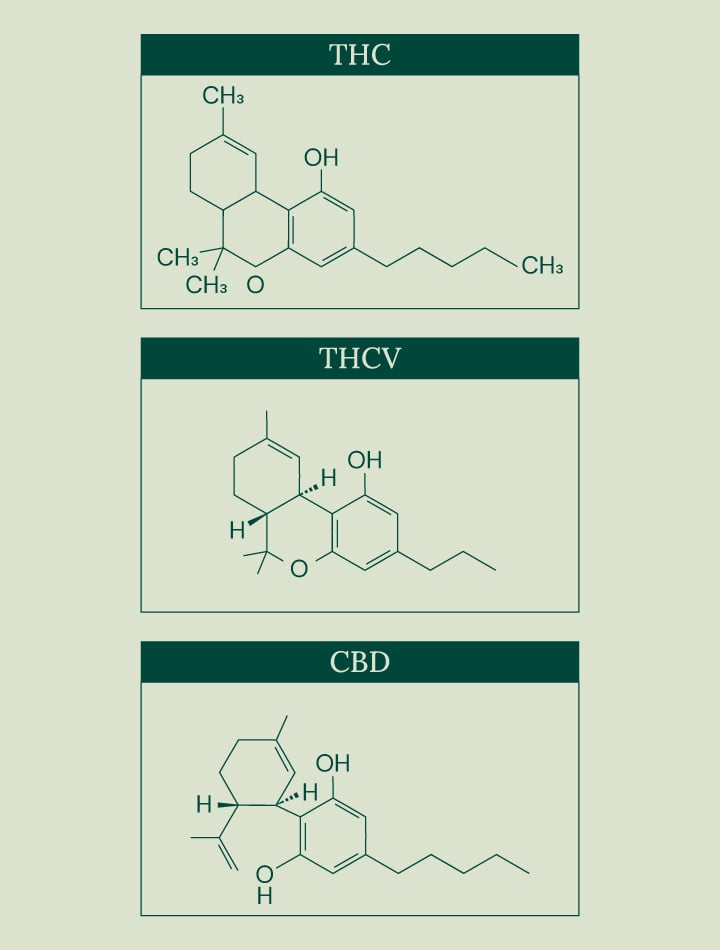
THCV vs THC: What’s the Difference?
Chemically, the main thing that distinguishes THCV from THC is the presence of a 3-carbon group instead of a 5-carbon group in its molecular structure. As far as effects go, THCV can be just as psychoactive as THC (at high-enough concentrations).
Both THC and THCV interact with the CB1 and CB2 receptors of the endocannabinoid system. At low doses, however, THCV acts as an antagonist of the CB1 receptor, instead of being an agonist like THC.
This means that small amounts of THCV may reduce the psychotropic influence of THC. Low doses may also counteract some of the side effects associated with THC, like anxiety, paranoia, increased heart rate, and even excess appetite. At higher doses, though, THCV becomes an agonist of CB1 receptors (just like THC), thus producing similar psychoactive effects.
THCV’s boiling point is 220°C (428°F), higher than that of THC. This has to be taken into account when vaping high-THCV concentrates, as lower temperatures will fail to target the compound sufficiently.
| THC |
|
| THCV |
|
| THC |
|
| THCV |
|
THCV Effects: How Does It Make You Feel?
You’re now all clued up on how THCV compares to THC. But what exactly can you expect when you blaze THCV-rich buds or concentrates? Get a better idea of the THCV experience below.
Psychoactive Properties: Does THCV Get You High?
THCV can produce a high, but its effect differs from THC in terms of both intensity and duration. This cannabinoid works in a biphasic manner, meaning its effects change depending on the dose.
At low doses, THCV acts as a neutral antagonist of the CB1 receptor. Simply put, this means the molecule either blocks this site without affecting it, or only partially activates it.
Although small concentrations of THCV don’t induce a high, researchers are exploring sub-threshold doses for their appetite-suppressing and mood-boosting potential.
High doses of THCV, in contrast, do trigger a high. At such concentrations, the cannabinoid becomes a partial agonist of the CB1 receptor, resulting in a psychoactive effect that is somewhat distinct from that of THC. Expect a stimulating, uplifting, and clear-headed effect.
How Long Does THCV’s Effect Last?
Sometimes described as the “race car” cannabinoid, the effects of THCV are reported to come on rapidly and dissipate quickly. While no scientific literature documents the onset and duration of the cannabinoid, limited user reports suggest that THCV offers somewhat of a “short-acting” high that comes on in a burst and wears off in a hurry.
However, THCV likely affects people differently based on several different variables, including dose, consumption method, and individual genetics and metabolism.
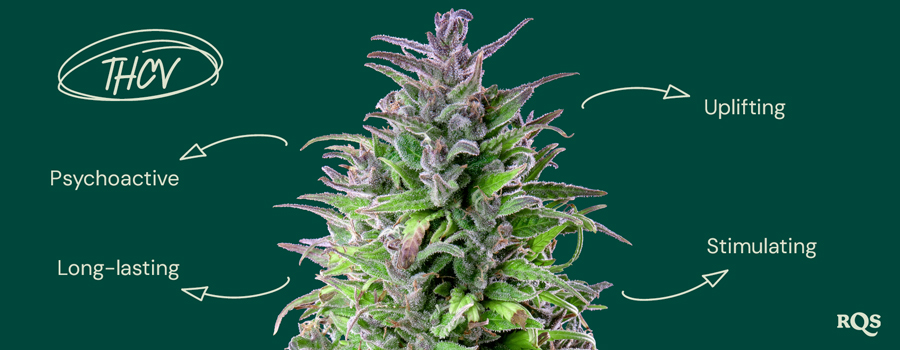
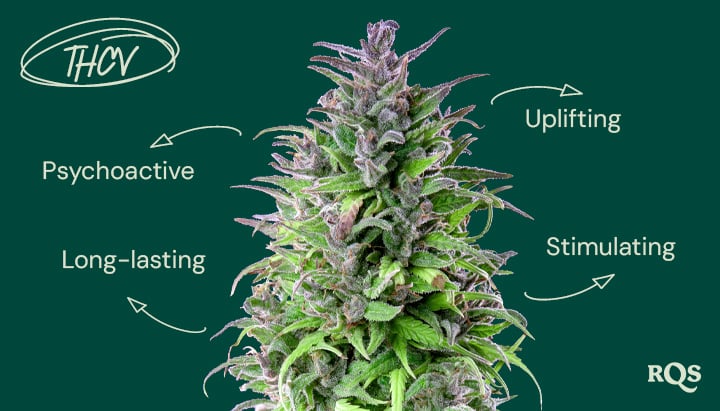
THCV Benefits: What the Science Says
The science surrounding cannabinoids still remains early, partly due to the prohibited status of cannabis throughout much of the world. However, scientists are making headway in some areas, including testing various cannabis-derived constituents on models of disease in preliminary studies.
Continue reading to discover the latest findings surrounding the potential benefits of THCV.
Appetite: A Look at the “Diet Weed” Claims
It’s no secret that THC causes the munchies; most smokers can’t resist raiding the fridge during or after a smoking session. THCV, in contrast, could help to curb appetite.
Several preclinical studies[1] suggest that the cannabinoid could act as an appetite suppressant, earning high-THCV strains the nickname of “diet weed”. These investigations looked at the effects of the cannabinoid on food intake and glucose tolerance in animals.
Seeing these early findings, it didn’t take some users long to draw the ambitious conclusion that they could kill two birds with one stone, getting high and losing weight simultaneously.
Caught up in the hype, many weed users drew comparisons between THCV and rimonabant—an anti-obesity drug that blocks the CB1 receptor and is now banned for its serious psychiatric side effects.
THCV does block the CB1 receptor at low doses but doesn’t work in the same way as rimonabant. The research remains far too early to conclude whether THCV impacts weight loss in humans.
However, a metabolic syndrome study[2] that tested THCV/CBD strips on weight loss and blood pressure in human volunteers has helped to advance understanding in this area.
Research[3] has also analysed the effects of THCV on glycemic and lipid parameters in human patients with type 2 diabetes. Future findings in this area could determine if THCV could play a role in addressing this metabolic condition.
Antipsychotic
Researchers have identified a link between using high-THC cannabis strains and psychosis. However, other compounds within the plant are being studied for their potential to help reduce psychotic symptoms—including THCV.
Research published in the British Journal of Pharmacology in 2015 tested THCV on 5-HT1A serotonin receptors in human and rat cells. This study[4] has helped to lay the groundwork for future investigations on the role of THCV in treating mental health conditions.
Energy & Mental Clarity
Aside from its clinical potential, THCV also offers holistic appeal, with benefits to overall well-being and performance. While many strains high in THC often cause sluggishness, strains high in THCV offer an energising, lucid, and cerebral effect that may be appealing to those looking to enhance creativity, motivation, and accomplish certain tasks.
THCV vs CBD: How Do They Compare?
We’ve given you a side-by-side comparison of THCV and THC. But how does THCV compare to CBD? Check out the table below to explore their similarities and differences.
| CBD |
|
| THCV |
|
| CBD |
|
| THCV |
|
Is THCV Legal?
The legal status of THCV is unclear in many countries. Unlike THC, THCV is federally legal in the United States under the 2018 Farm Bill—a piece of legislation that allows the sale of hemp-derived products with THC concentrations under 0.3%.
However, local laws vary between states in the country. While legal in states including Alabama, California, Georgia, and Hawaii, the cannabinoid remains explicitly illegal in Colorado and legally ambiguous or unregulated in other states.
THCV laws also remain confusing across Europe, with regulations concerning cannabinoids varying widely across European states. Given the absence of explicit regulations in many countries, THCV often falls into a gray area.
Drug legislation in most European countries fails to specifically mention THCV, likely because of its novel status. However, the majority continue to prohibit cannabis production and possession, and no EU-approved hemp strains are significant sources of THCV.
Technically, the cannabinoid has become legal by default in countries that have legalized cannabis cultivation, such as Malta and Luxembourg, as citizens can grow high-THCV varieties.
The bottom line: thoroughly research the legal status of THCV in your local area before buying, possessing, or growing cannabis products that contain the cannabinoid.
Will THCV Show Up on a Drug Test?
No drug tests are currently used to specifically detect THCV. However, there are several important factors to keep in mind when using the cannabinoid.
First, all available cannabis strains that possess high levels of THCV also contain enough THC to trigger a positive drug test. Second, even when consuming THC-free concentrates and isolates, you still run the risk of a positive test.
Because THCV shares a similar structure to THC, it produces similar metabolites in the body as it breaks down. THC drug tests are typically triggered by the metabolite THC-COOH, which THCV also produces. If you’re subject to routine drug tests, you should avoid consuming THCV.
Where to Find THCV?
For those curious, there are several different avenues available to experience the effects of THCV, including cannabis flowers from particular strains, edibles such as gummies, and concentrates.
As it stands, most common strains contain less than 1% THCV, which makes this cannabinoid expensive to extract in large quantities. Higher amounts of THCV have been found in descendants of pure sativa landraces from Africa and Nepal.
Breeding hemp strains that are high in THCV and low in THC is one of the new challenges for cannabis breeders, and various other breeders are creating cultivars with notable THCV and THC levels.
If you want to grow weed plants with higher levels of THCV, you can generally look to sativa genetics, but remember that cannabinoid content can vary from harvest to harvest. In turn, note that growing setups that simulate tropical climates are more likely to yield more THCV.
Strains like Durban Poison, Jack the Ripper, and the rare Doug's Varin all possess some of the highest amounts of THCV. African sativas like Power Flower (a progeny of Jack the Ripper like Mother Gorilla) or descendants of Durban Poison (like Royal Cookies) should also develop notable amounts of THCV. However, only Doug’s Varin was specifically bred for THCV.
Discover Royal THCV
Many cannabis users are excited about the rise of “novel” cannabinoids such as THCV. These compounds produce unique effects and are destined to add something new to the cannabis experience.
But, as mentioned, most strains contain only trace levels of THCV. Even the landrace and wild-type varieties that possess the highest concentrations of this molecule only contain up to around 1%. Therefore, it takes a lot of hard work to create varieties with significant levels.
Fortunately for those seeking this cannabinoid, breeders at Royal Queen Seeds pursued this important work with a passion. After crossing a pure African sativa with Durban Haze and stabilising the progeny, they created Royal THCV.
Royal THCV
|
|
Pure African Sativa x Durban Haze |
|
|
500 - 550 gr/m2 |
|
|
80 - 120 cm |
|
|
9 - 10 weeks |
|
|
THC: 7% |
|
|
Sativa 95% Indica 5% |
|
|
425 - 475 gr/plant |
|
|
140 - 180 cm |
|
|
Late October |
|
|
Clear, Motivating , Uplifting |
|
|
7% |
This vastly sativa-dominant hybrid produces dense colas that manufacture a THCV content of 7% and equal levels of THC. This fine balance of cannabinoids produces a subtle, inspiring effect that isn’t overwhelming.
Overall, these flowers exert an energising experience, making this strain an excellent choice for daytime use. The addition of THCV counteracts the munchies and helps the mind to remain clear. Welcome tastes of earth, fruit, and herbs accompany the experience.
When it comes to cultivation, Royal THCV makes life easy for growers. She maintains a height of 80–120 cm indoors and produces up to 550 g/m² after 9–10 weeks of flowering. Plants grown outdoors top out at 180 cm and offer a return of 425–475 g/plant in late October.
THCV Gummies & Edibles: What to Expect
Available in dispensaries in certain states in the US, you’ll also find a range of THCV edible products, including gummies. These products vary in both their cannabinoid concentrations and flavors, with options including blueberry, lemon, and strawberry. Many products also contain formulas that include CBD and other cannabinoids.
Much like when ingesting THC, THCV passes through the digestive tract and liver and takes around 30–60 minutes to take effect. However, unlike THC, THCV doesn’t convert into the potent metabolite 11-hydroxy-THC.
Overall, you can expect a shorter and possibly more intense effect with THCV edibles, marked by clear-headedness. However, you should also treat THCV edibles with caution. Start out with low doses and gradually increase the amount you take each session to avoid a negative experience.
Is There a Future for THCV?
THCV certainly has a bright future. While the cannabinoid remains relatively unknown compared to THC and CBD, growing consumer interest indicates that it could become a popular molecule in its own right.
Research remains very early, and confusing and ambiguous laws across the West continue to obstruct the adoption of this compound. However, as research and development continues, and laws move more favorably towards cannabis liberalisation, THCV will likely start cropping up in wellness products and pharmaceutical drug formulations.
Breeding high-THCV strains will also play a critical role in the image of THCV in the mainstream. While challenging due to a lack of genetic stock, we can expect many new cultivars to emerge over the coming years that will give growers more options when it comes to cultivating plants packed with this cannabinoid.
Keep your eyes peeled for the inevitable rise of THCV, and consider growing the strains mentioned above for a taste of what this compound has to offer!
THCV: FAQ
- What is THCV, and what is it good for?
- THCV is a cannabinoid known for its clear-headed high and fast-acting effects. It’s ideal for users looking to remain sharp and focused.
- Does THCV get you high?
- Yes. At higher doses, THCV produces a psychoactive effect by binding to the CB1 receptor.
- Is THCV legal?
- The legal status of THCV remains confusing and blurry across much of the world. While explicitly legal in some American states, it falls into a grey area across most of Europe.
- What strains are high in THCV?
- Royal THCV and Durban Poison contain notable amounts of THCV.
- Tetrahydrocannabivarin is Not Tetrahydrocannabinol - PubMed https://pubmed.ncbi.nlm.nih.gov
- Weight Loss and Therapeutic Metabolic Effects of Tetrahydrocannabivarin (THCV)-Infused Mucoadhesive Strips | Cannabis https://publications.sciences.ucf.edu
- Efficacy and Safety of Cannabidiol and Tetrahydrocannabivarin on Glycemic and Lipid Parameters in Patients With Type 2 Diabetes https://diabetesjournals.org
- The phytocannabinoid, Δ⁹-tetrahydrocannabivarin, can act through 5-HT₁A receptors to produce antipsychotic effects - PubMed https://pubmed.ncbi.nlm.nih.gov


























